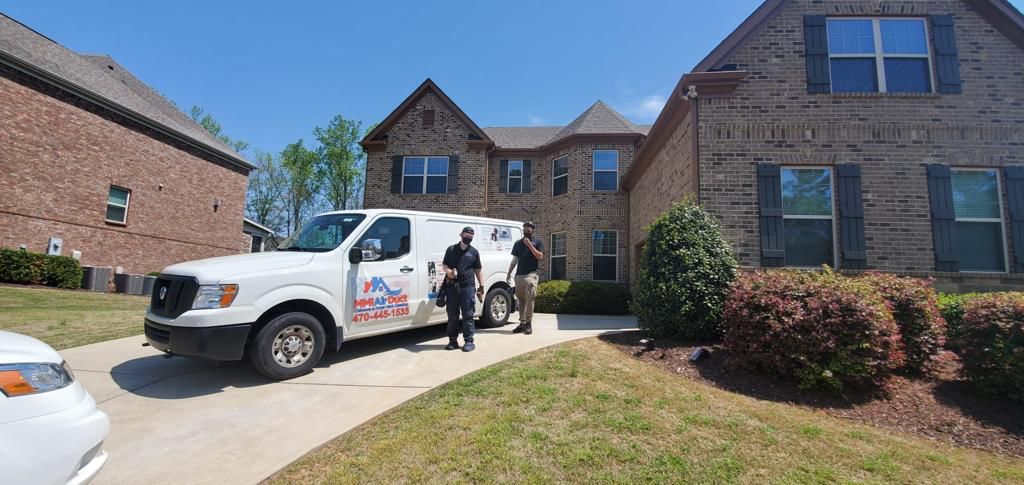The air conditioning system in your home is vital to your overall comfort. It’s also critical for the overall health of an infant or an elderly family member. When your AC won’t turn on, do not panic. There are a few simple steps you can take to find out why your system isn’t working.
The most common reasons for your air conditioner not turning on are listed below. You can find out the problem by reading this article or contact HVAC Cleaning in Lawrenceville, GA, for assistance.

Thermostat is Malfunctioning
A faulty thermostat affects the performance of your unit. Firstly, make sure your thermostat’s screen is on. It can’t tell the AC to switch on if the screen is off. Secondly, if you have a thermostat that operates with a battery, make sure the batteries are working.
If the batteries are not dead, inspect the thermostat’s operation. Set it to a cold temperature, five to ten degrees below the room temperature. Put your hands in front of the air vent after several minutes to feel the cool air.
If your air conditioner still won’t switch on, switch off the thermostat and remove the lid to inspect the inner components. Examine the area for any dirt or rust. Check for blown circuits as well; these might sometimes be the source of the problem. You can wipe away the debris with a gentle brush, but the removal of rust will require the assistance of a specialist. Check for any screws loose or wires within the thermostat as well.
Air Filters are Clogged
The filters’ job is to keep the air flowing properly. When they are clogged with dirt, ventilation is obstructed. In this scenario, your system will have to work extra hard to cool the house, and it may eventually fail.
Clogged air filters can also cause your outdoor AC unit to freeze. It can also obstruct its operation and, in some cases, prevent it from turning on.
The evaporator coil is in the indoor unit of your air conditioner, whereas the compressor is located in the outdoor unit. Between these two components is the refrigerant line. Hot air from your home has no access to the refrigerant when the airflow is blocked. Any moisture on the coils then freezes as the refrigerant cools.
You have the option of hiring Air Duct Cleaning in Lawrenceville, GA, to handle the situation or cleaning the filters yourself. Because the ice on the coils will melt, make sure to drain the water appropriately. Allow the filters to dry before switching on the air conditioner after cleaning thoroughly.
You can avoid this problem in the future with regular inspection.
Capacitor Stops Working
If your air conditioner has difficulties switching on, or if you notice clicking noises, likely, the capacitor in your AC is not working correctly.
The capacitor is an essential component of any heating and cooling system. It attaches to the motor’s circuit and provides an initial charge for the motor to begin running. Once the motor reaches a certain speed, the capacitor disconnects from the circuit.
The capacitor in your air conditioner is heat-sensitive. Overheating can occur as a result of your air conditioner working too hard to reach the required temperature. Another reason is sun exposure. During summertime, if your outdoor unit is on the roof, it will most certainly overheat.
Avoid setting your thermostat to the maximum or minimum temperature on extremely cold or hot days. It forces the device to work harder, potentially resulting in the capacitor overheating.
Power failures and variations can potentially cause the capacitor to suffer severe damage. You can install a surge protector to defend your equipment from power surges.
Low Refrigerant
A low refrigerant could be one of the reasons your air conditioner won’t turn on. A refrigerant is a cooling fluid found in the coils of an air conditioner. It is primarily responsible for delivering the desired cool air from your air conditioner.
The low refrigerant is not due to your air conditioner depleting the fluid. In this case, leakage is most likely to blame. The AC coil may develop breaches over time, resulting in leaking. Furthermore, failing to schedule routine maintenance can result in rust in the long run.
Breaker has Tripped
Your air conditioner will not turn on if the circuit breaker has been tripped. So, if your air conditioner isn’t turning on, check the breaker. A circuit breaker is a safety device that cuts the electricity in a surge of high voltage. It could be caused by high-voltage devices or power surges in the electrical system. All you have to do now is locate the air conditioner circuit breaker and entirely switch it off. Before turning it on, wait a couple of minutes. If it keeps tripping, don’t try to switch it on because it means there’s a high voltage present, which could result in an electric fire.
Problems with Power Cord and Outlet
Sometimes the problem isn’t so serious; it’s simply that you’re expecting the worst. So, look at the simple items right in front of you, such as the power cord.
If your unit has been stored for a season, the power cable may tear and wear out. Power outages might potentially damage the power cord. Unplug the cord to take a deeper look. You’ll have to replace it if it exhibits symptoms of damage.
Perhaps the problem isn’t with the cord, but with the outlet. You can plug in other appliances to see if the outlet is operating correctly. If none of them works, the outlet is the culprit. .
